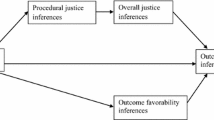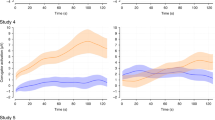Abstract
System justifying beliefs can have adaptive consequences for individuals that include enhanced coping and decreased emotional distress. The present study examined whether individual differences in two kinds of system justifying beliefs uniquely predict dispositional affect. Participants from across the United States were recruited via internet to complete dispositional measures of procedural and distributive justice beliefs, and also brief measures of positive and negative affectivity. While belief in fair outcomes (distributive just world beliefs) was generally associated with greater positive affectivity, belief in fair processes (procedural just world beliefs) was modestly associated with decreased negative affectivity. In addition, positive and negative affectivity were predicted by interactions between procedural and distributive just world beliefs, with each accentuating the general emotional benefit provided by the other. Finally, an interactive effect of procedural just world beliefs and social class was obtained for positive affectivity, with greater positive affectivity occurring for disadvantaged (lower income) individuals who had strong procedural just world beliefs. In general, these results suggest the potential for unique and interactive relationships between particular system justifying beliefs and measures of emotion, especially among members of advantaged versus disadvantaged groups.


Similar content being viewed by others
References
Adams, J. S. (1965). Inequity in social exchange. In L. Berkowitz (Ed.), Advances in experimental social psychology. New York: Academic.
Aiken, L. S., & West, S. G. (1991). Multiple regression: Testing and interpreting interactions. Thousand Oaks: Sage.
Bembenek, A. F., Beike, D. R., & Schroeder, D. A. (2007). Justice violations, emotional reactions, and justice-seeking responses. In D. De Cremer (Ed.), Advances in the psychology of justice and affect (pp. 13–33). Greenwich: Information Age.
Bulman, R. J., & Wortman, C. B. (1977). Attributions of blame and coping in the “real world”: severe accident victims react to their lot. Journal of Personality and Social Psychology, 35, 351–363.
Campos, J. J., Campos, R. G., & Barrett, K. C. (1989). Emergent themes in the study of emotional development and emotion regulation. Developmental Psychology, 25, 394–402.
Chow, R. M., Tiedens, L. Z., & Govan, C. (2008). Excluded emotions: The role of anger in responses to social ostracism. Journal of Experimental Social Psychology, 44, 896–903.
Dalbert, C. (1997). Coping with an unjust fate: the case of structural unemployment. Social Justice Research, 10(175), 189.
Dalbert, C. (2001). The justice motive as a personal resource: Dealing with challenges and critical life events. New York: Kluwer Academic/Plenum.
Dalbert, C., Montada, L., & Schmitt, M. (1987). Glaube an die gerechte Welt als Motiv: Validnering Zweier Skalen. Psychologische Beitrage, 29, 596–615.
De Cremer, D., & Van den Bos, K. (2007). Justice and feeling: towards a new era in justice research. Social Justice Research, 20, 1–9.
De Vogli, R., Ferrie, J. E., Chandola, T., Kivimäki, M., & Marmot, M. G. (2007). Unfairness and health: evidence from the Whitehall II study. Journal of Epidemiology & Community Health, 61, 513–518.
Dzuka, J., & Dalbert, C. (2002). Mental health and personality of Slovak unemployed adolescents: the impact of belief in a just world. Journal of Applied Social Psychology, 32, 732–757.
Feather, N. T. (1991). Human values, global self-esteem, and belief in a just world. Journal of Personality, 59, 83–107.
Folger, R., Rosenfield, D., Grove, J., & Corkran, L. (1979). Effects of “voice” and peer opinions on responses to inequity. Journal of Personality and Social Psychology, 307, 2253–2261.
Folkman, S., & Lazurus, R. S. (1980). An analysis of coping in a middle aged community sample. Journal of Health and Social Behavior, 21, 219–239.
Greenberg, J. (1990). Organizational justice: yesterday, today, and tomorrow. Journal of Management, 16, 399–432.
Hafer, C. L., & Bègue, L. (2005). Experimental research on just-world theory: problems, developments, and future challenges. Psychological Bulletin, 131, 128–67.
Jost, J. T., & Banaji, M. R. (1994). The role of stereotyping in system justification and the production of false consciousness. British Journal of Social Psychology, 33, 1–27.
Jost, J. T., & Burgess, D. (2000). Attitudinal ambivalence and the conflict between group and system justification motives in low status groups. Personality and Social Psychology Bulletin, 26, 293–305.
Jost, J. T., & Hunyady, O. (2002). The psychology of system justification and the palliative function of ideology. European Review of Social Psychology, 13, 111–153.
Jost, J. T., & Hunyady, O. (2005). Antecedents and consequences of system-justifying ideologies. Current Directions in Psychological Science, 14, 260–265.
Jost, J. T., Pelham, B. W., Sheldon, O., & Sullivan, B. (2003). Social inequality and the reduction of ideological dissonance on behalf of the system: evidence of enhanced system justification among the disadvantaged. European Journal of Social Psychology, 32, 1–24.
Jost, J. T., Banaji, M. R., & Nosek, B. A. (2004). A decade of system justification theory: accumulated evidence of conscious and unconscious bolstering of the status quo. Political Psychology, 25, 881–919.
Kivimäki, M., Ferrie, J. E., Brunner, E., Head, J., Shipley, M. J., Vahtera, J., et al. (2005). Justice at work and reduced risk of coronary heart disease among employees. Archives of Internal Medicine, 165, 2245–2251.
Lerner, M. J. (1980). The belief in a just world: A fundamental delusion. New York: Plenum.
Lind, E. A., & Tyler, T. R. (1988). The social psychology of procedural justice. New York: Plenum.
Lipkus, I. M., Dalbert, C., & Siegler, I. C. (1996). The importance of distinguishing the belief in a just world for self versus others. Personality and Social Psychology Bulletin, 22, 666–677.
Lucas, T., & Goold, S. (2008). The malleability of belief in a just word: evidence from a health resource allocation exercise. Psychology Journal, 5, 92–104.
Lucas, T., Alexander, S., Firestone, I. J., & LeBreton, J. M. (2007). Development and initial validation of a procedural and distributive just world measure. Personality and Individual Differences, 43, 71–82.
Lucas, T., Alexander, S., Firestone, I. J., & LeBreton, J. M. (2008). Just world beliefs, perceived stress, and health behavior: the impact of a procedurally just world. Psychology & Health, 23, 849–866.
Nosek, B. A., Banaji, M. R., & Greenwald, A. G. (2002). Harvesting implicit group attitudes and beliefs from a demonstration website. Group Dynamics, 6, 101–115.
Otto, K., Boos, A., Dalbert, C., Schöps, D., & Hoyer, J. (2006). Posttraumatic symptoms, depression, and anxiety of flood victims: the impact of the belief in a just world. Personality and Individual Differences, 40, 1075–1084.
Ritter, C., Benson, D. E., & Snyder, C. (1990). Belief in a just world and depression. Sociological Perspectives, 33, 235–252.
Sutton, R. M., & Douglas, K. M. (2005). Justice for all, or just for me? More support for self-other differences in just world beliefs. Personality and Individual Differences, 39, 637–645.
Tepper, B. J. (2001). Health consequences of organizational injustice: tests of main and interactive effects. Organizational Behavior and Human Decision Processes, 86, 197–215.
Thibaut, J., & Walker, L. (1975). Procedural justice: A psychological analysis. New Jersey: LEA.
Tomaka, J., & Blascovich, J. (1994). Effects of justice beliefs on cognitive appraisal of and subjective physiological and behavioral responses to potential stress. Journal of Personality and Social Psychology, 67, 732–740.
Tyler, T. R. (1994). Psychological models of the justice motive: antecedents of distributive and procedural justice. Journal of Personality and Social Psychology, 67, 850–863.
Tyler, T. R., & Blader, S. L. (2003). The group engagement model: procedural justice. Social Identity, and Cooperative Behavior, Personality and Social Psychology Review, 7, 349–361.
Tyler, T. R., & McGraw, K. M. (1986). Ideology and the interpretation of personal experience: procedural justice and political quiescence. Journal of Social Issues, 42, 115–128.
Tyler, T. R., & Smith, H. J. (1998). Social justice and social movements. In D. T. Gilbert, S. T. Fiske & G. Lindzey (Eds.), The handbook of social psychology (4th ed., Vol. 2, pp. 595–629). Boston: McGraw-Hill.
Van den Bos, K. (2005). What is responsible for the fair process effect? In J. Greenberg & J. A. Colquitt (Eds.), Handbook of organizational justice (pp. 273–300). New Jersey: LEA.
Vermunt, R., & Steensma, H. (2003). Physiological relaxation: stress reduction through fair treatment. Social Justice Research, 16, 135–149.
Vermunt, R., & Steensma, H. (2005). How can justice be used to manage stress in organizations. In J. Greenberg & J. A. Colquitt (Eds.), Handbook of organizational justice (pp. 383–410). New Jersey: LEA.
Vermunt, R., Wit, A., Van den Bos, K., & Lind, E. A. (1996). The effects of unfair procedure on negative affect and protest. Social Justice Research, 9, 109–119.
Wakslak, C., Jost, J. T., Tyler, T. R., & Chen, E. (2007). Moral outrage mediates the dampening effect of system justification on support for redistributive social policies. Psychological Science, 18, 267–274.
Walster, E., Walster, G. W., & Berscheid, E. (1978). Equity: Theory and research. Boston: Allyn and Bacon.
Watson, D., Clark, L. A., & Tellegen, A. (1988). Development and validation of brief measures of positive and negative affect: the PANAS scales. Journal of Personality and Social Psychology, 54, 1063–1070.
Weiner, B. (1985). An attributional theory of achievement motivation and emotion. Psychological Review, 92, 548–573.
Weiss, H. M., Suckow, K., & Cropanzano, R. (1999). Effects of justice conditions on discrete emotions. Journal of Applied Psychology, 84, 786–794.
Acknowledgements
I am thankful to Brian Zikmund-Fisher and other members of the Center for Behavioral and Decision Sciences in Medicine (Ann Arbor Veterans Affairs Medical Center and University of Michigan) for their assistance with data collection. Funding for collection of this data came from a grant from the National Institutes for Health (NIH R01 CA87595). Portions of this research were presented at the 2007 Psychology and Social Justice Conference (New York).
Author information
Authors and Affiliations
Corresponding author
Rights and permissions
About this article
Cite this article
Lucas, T. Justifying Outcomes Versus Processes: Distributive and Procedural Justice Beliefs as Predictors of Positive and Negative Affectivity. Curr Psychol 28, 249–265 (2009). https://doi.org/10.1007/s12144-009-9066-x
Published:
Issue Date:
DOI: https://doi.org/10.1007/s12144-009-9066-x




